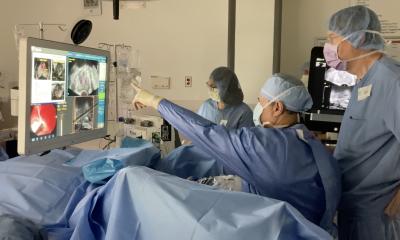
Image source: Adobe Stock/kenchiro168
News • Restoring responsiveness
New method could crack treatment-resistant prostate cancer
It may be possible to restore drug-resistant neuroendocrine prostate cancer to a state that responds to treatment by depletion of a certain protein in cancer cells.
A recent study by the University of Eastern Finland found that this protein, DPYSL5, is expressed in neuroendocrine prostate cancer. The study was published in Nature Communications Biology.
Prostate cancer is the most common cancer in men, and the second most common cause of cancer death in Western countries. The growth of prostate cancer often depends on androgens, and the effect of androgens is sought to be reduced by drug therapy, especially in metastatic prostate cancer. However, cancer cells can become resistant to drugs, resulting in castration-resistant prostate cancer.
Recommended article

Article • Research, diagnostics, therapy
Focus on prostate cancer
Prostate cancer (PCa) is not only one of the most common, but also one of the deadliest types of cancer in men. Diagnostics are correspondingly sophisticated, from imaging via ultrasound or MRI to various biopsy techniques – often even in combination. Keep reading for current developments in early detection, staging, therapy and research.
Second-generation antiandrogens, which are drugs that inhibit the activity of the androgen receptor, have been developed as a treatment alternative for castration-resistant prostate cancer. Unfortunately, recent studies have shown that about one in four castration-resistant prostate cancers develop into what is known as treatment-induced neuroendocrine cancer, which is aggressive and typically leads to death within a year of the diagnosis. Neuroendocrine prostate cancer cells usually do not have androgen receptors, and currently no treatment is available for this group of patients.
At the University of Eastern Finland, the Ketola Lab led by Academy Research Fellow Kirsi Ketola explores the differentiation, plasticity and development of drug resistance in cancer cells. In the new study, researchers at the Ketola Lab discovered a potential new target for drug development in neuroendocrine prostate cancer. The protein, DPYSL5, is expressed especially in this cancer type and could therefore be a suitable target for drug therapy. The Ketola Lab collaborated with the University of British Columbia in Canada, utilising the university’s extensive collection of neuroendocrine prostate cancer patient tumor samples to verify the expression of the DPYSL5 protein in these samples.
Normally, the DPYSL5 protein regulates the development of neurons in the brain and is not expressed in other parts of the body. However, the researchers now found that antiandrogen treatment caused the DPYSL5 protein to be expressed in prostate cancer cells. As a result, these cells acquired stem cell-like and neuron-like properties observed in neuroendocrine prostate cancer cells.
DPYSL5 promoted cell transformation by activating the PRC2 complex, which caused cancer cells to go into a stem cell-like state. DPYSL5 also caused cancer cells to form extensions similar to those found in neurons, which helped them to invade the surrounding tissue. However, depletion of DPYSL5 inactivated the PRC2 complex, prevented the formation of neuron-like extensions, and restored cells to a state where antiandrogen treatment was once again effective preventing cell division.
The findings can be used for the development of new cancer drugs. “Next, our goal is to screen drugs that inhibit the function of DPYSL5,” Academy Research Fellow Ketola says. Novel imaging methods made available by the Cell and Tissue Imaging Unit led by Ketola will be used in drug screening. The unit constitutes part of the Biocenter Kuopio and Biocenter Finland.
Source: University of Eastern Finland
06.02.2024










